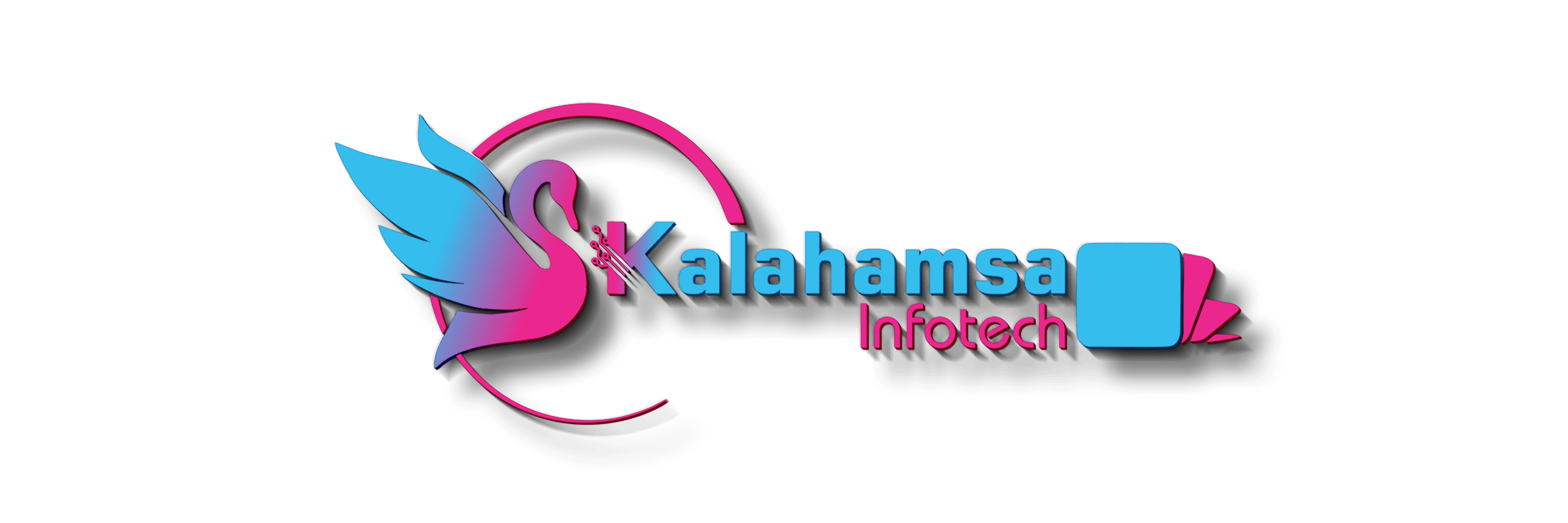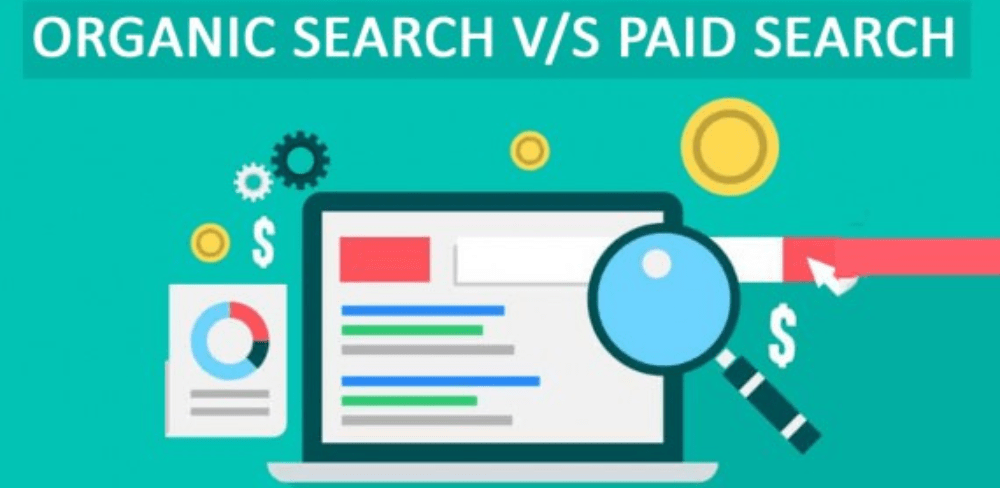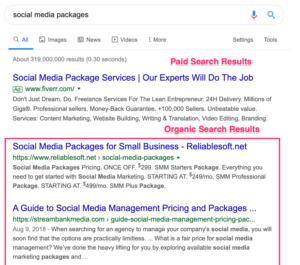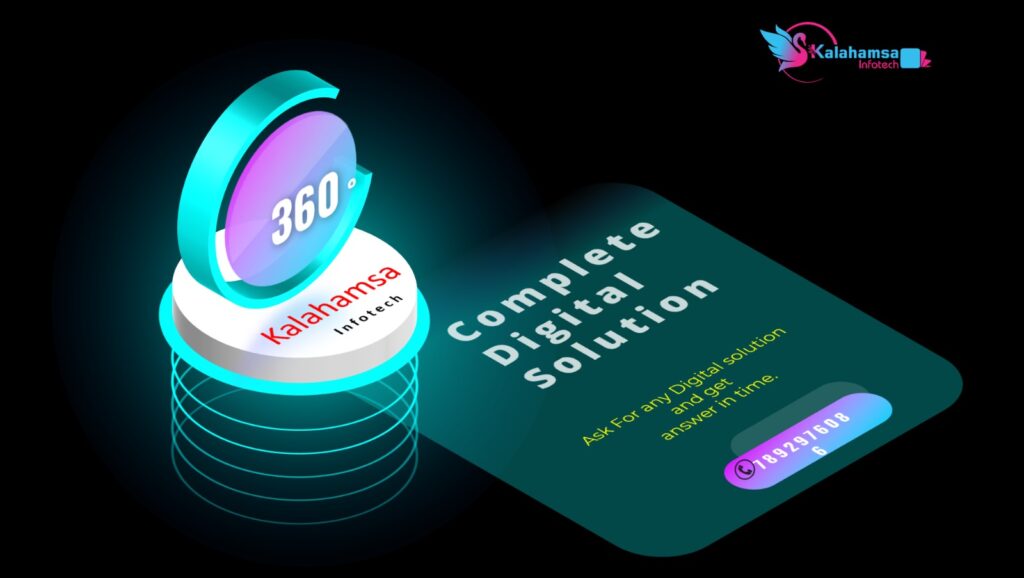Organic search vs paid search….!
Today’s era of the Internet has opened a gate to a vast variety of opportunities for businesses. Using social networks, one cannot only share a private picture of one’s birthday but also earn customers for one’s business and reach them conveniently. The speed and ease with which digital media transmits information and help boost a business are amazing.
Digital Marketing is the term used for the targeted, measurable, and interactive marketing of products or services using digital technologies to reach the viewers, turn them into customers, and retain them. Digital marketing achieves targets of marketing a business through different online channels.
In its simplest form, the term “digital marketing” refers to using digital channels (i.e., marketing channels that are typically accessible via the Internet) to connect and engage with your prospects and customers.
Digital marketing has become an essential part of advertising because of the popularity of online shopping and digital spaces. Promoting your website can have a positive impact on the success of your company.
Organic search vs paid search — it’s an ongoing debate in the digital marketing community. Which is better? Which earns more significant results? And which should brands pursue as part of their strategy?
The short answer is that it depends. There are a lot of factors to consider, like how soon you need results, what kind of traffic you want to drive to your site, and what specific goals you have in mind.
And actually, the right answer for most brands is usually both. A combination of organic and paid search marketing is the best recipe for success long term.
Organic Search
Organic traffic is completely about Search Engines. Once you get a high rank for your website in search engines, you will be able to achieve your goals successfully.
Organic traffic is the term used to describe visits to a website coming from a search engine’s organic results and not paid ads.
When users type a query in a search engine (such as Google or Bing), they are presented with a set of results that includes both the pages ranking in the top positions organically and a set of ads (usually denoted with the word Ad) to differentiate them from the organic results.
When a user clicks on any of the organic results and visits a website this is recorded in analytics tools as organic search traffic.
Paid Search
Getting traffic through paid search is also an effective approach, but it can be chosen if you can invest a good amount of money and time.
Paid search is a marketing initiative where companies pay to advertise their product or service on a search engine or website. They pay the website each time it displays their ad (cost per thousand) or each time a user clicks their ad, also called pay per click. These ads display in a carousel format at the top of the search page or as text links listed before the search results.
Why is paid searching important?
Here are some reasons paid search has become an important aspect of digital advertising:
- Drives traffic
- Optimizes your budget
- Allows for experimentation
- Attract quality leads
- Get instant result
Organic search vs Paid search
Preferring one over the other and landing on one decision is indeed a tough choice. No matter which option you choose, the end goal; for both paths is the same: driving more traffic towards your site and converting visitors into leads, just in two different forms.
Indeed, there are various parameters that can help you evaluate the difference between both, but mainly Budget, Short Run vs. Long Run, and SERP Competition which will help you make the right choice.
The primary difference between organic search and paid search is its cost. As you can gather from their names, organic search earns natural results at no cost while paid search pays directly for prominent SERP positions.
Organic search works like this: companies use content marketing and SEO tactics to earn SERP rankings for keywords, phrases, and topics related to their brand. Users then see that content on their own results pages when they make relevant search queries, making them more likely to click and visit the site.
Paid search pays to jump above the organic search results and appear at the top of the SERP so that users see it first. It’s usually executed with a pay-per-click (PPC) model, where a company pays the search engine every time someone actually clicks on the ad.
Which will you choose?
Now that you know the benefits of paid search and marketing, you’ll find that the answer is different for each person. Some start-ups may not have the budget for paid marketing, and in such cases, organic search is the best option.
Others may be operating in such a competitive industry that some paid search efforts are required to stay competitive in certain markets. This is a good rule of thumb. All brands should use organic search marketing because there are practically no drawbacks. It’s free. Proven to work for companies of all sizes and in all industries.
If you’re new to search marketing, The recommended option is to select Organic Search to improve the rank of your website. This can be your first step.
Once everything is in place, find out where you need an extra push. Consider what you know about keyword research and what opportunities exist to make paid search marketing truly worthwhile. Then, launch a paid marketing strategy to complement your larger organic search marketing efforts.
So the real answer to organic search and paid search marketing is that it shouldn’t be a competition. Whenever possible, try to find potential customers at each stage of the funnel and use them as a compound strategy to find them where they already are: in the search engines.
Also Read: Meaning of digital marketing and opportunities
Conclusion
Generating traffic is the primary objective of every marketer. But many face challenges in understanding which traffic to focus on.
Well! Choosing one is not easy. But weighing the advantages and disadvantages of organic search vs. paid search will surely help you examine the budget and timeline and achieve the target.






